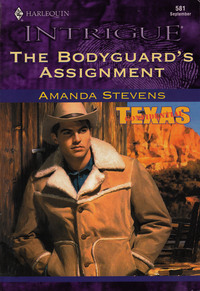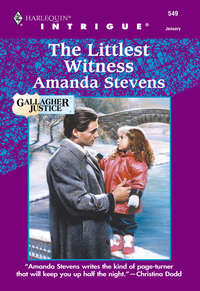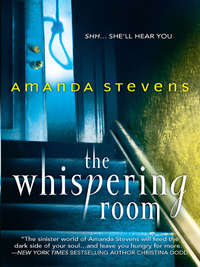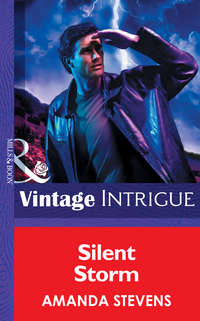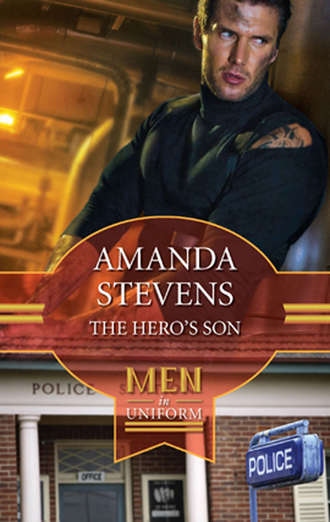
Полная версия
The Hero's Son
But one life would be saved.
And that was the only one that could be allowed to matter, Valerie thought, as she closed her eyes and finally succumbed to the medication.
THE DREAM WAS ALWAYS the same. Her name was Violet again, and she was back in that tiny house in southeast Memphis, watching through the crack in her bedroom door. She heard her mother scream, saw her father collapse to the floor, and then the big man turned and looked at Violet. Looked at her with those cold, black eyes.
The devil’s eyes.
Violet tried to scream, but no sound came out. She tried to shrink away, but couldn’t move. She was trapped, mesmerized by a gaze so dark and evil, she felt herself sinking into those bottomless depths from which she knew there would be no escape.
But she had to try. She had to try and save herself. She had to try and save her father.
Because if she didn’t, no one else would.
Violet fought her way up from the black pit. She struggled to free herself from the terror that claimed her, night after night.
As she finally reached the surface, the terror gave way to confusion, and Violet slowly became Valerie. But then she opened her eyes to find the devil himself staring down at her.
CHAPTER TWO
VALERIE GASPED and sprang up in bed.
“Take it easy. I didn’t mean to startle you.” His voice was deep and rich, not in the least threatening, but shivers scurried up Valerie’s spine. He reached out to ease her back against the pillows, but Valerie shrank away from him. “I’m Sergeant Colter,” he said.
What did one say to one’s nightmare?
“Valerie Snow,” she managed, clutching the sheet to her breast.
After her initial shock began to subside, Valerie realized who he must be. Why hadn’t she thought of it earlier? He had to be Judd Colter’s son because he was the spitting image of his father as he had looked thirty-one years ago when he’d stormed into a tiny home in southeast Memphis and changed three lives forever.
The resemblance almost took Valerie’s breath away.
She found herself staring up at him, studying his face longer than she should have, trying to analyze him with a reporter’s eye for detail.
There were subtle differences, she decided. He wasn’t exactly like his father. At least, not physically.
He was just as tall, but leaner than Judd Colter had been. His hair was just as dark, but he didn’t wear it in a military style like his father had. The thick strands brushed against his shirt collar, gleaming blue-black in the harsh fluorescent lighting.
His features were more even than his father’s. And more handsome, Valerie thought, startled to feel the quiver of butterflies in her stomach.
Oh, yes, there were definitely differences, but one thing remained the same: his eyes were just as dark and just as cold as his father’s.
Valerie shivered and tried to look away. “What do you want?”
“I need to talk to you.”
Reluctantly she met his gaze. “What about?”
One dark brow rose in surprise. Or was it condescension? “You’ve made a pretty serious accusation, Ms. Snow. Or have you forgotten?”
At first, she thought he was talking about her article, then she realized he meant the incident with the bus. “You mean when I said someone tried to kill me?”
Something flashed in his dark eyes. Something Valerie couldn’t quite define. “You didn’t say that exactly. You said you were pushed.”
She forced a harsh laugh. “Semantics, Sergeant Colter.”
“Hardly. Even if you were pushed, it could have been an accident.”
“Even if?” Valerie glared up at him. “I said I was pushed, and I was. And I think it was very deliberate.”
He took out a pen and notebook and pulled up a chair. “Why don’t we get the paperwork out of the way first, and then you can tell me what you think happened. What’s your full name?” When she hesitated, he glanced up. “Is that question too difficult for you?”
There was enough arrogance in his voice to stir her temper. Yes, and you have no idea why, she thought bitterly. “Is this going to take long?” Maybe if she stalled him, he would give up and go away. What was he going to do, anyway? Go looking for someone who had a reason to push her in front of a bus?
Well, he didn’t have far to look, did he?
“That depends on you,” he said.
She shrugged. “Guess I’m not going anywhere for a while.” That’s it, she thought. Tough it out. Don’t let him get to you.
After all, she was good at pretending, wasn’t she? She’d learned a long time ago not to let anyone see the real person, the real emotions, behind her hardened veneer.
“Your name,” he repeated, his pen poised over his notebook. His hands were large and well shaped, Valerie noticed. And ringless. He wasn’t married. She wondered why.
“Valerie Anne Snow.”
He started scribbling. “Address?”
She rattled off her street address and he wrote it down.
“All right,” he said, glancing up at her. “Why don’t you tell me what happened?”
“Just the facts, ma’am. Right?” When he didn’t respond to her sarcasm, Valerie shrugged and said, “Angie and I had just left work—”
“Angie?”
“Angela Casey. She writes an advice column for the Journal. That’s where I work,” she added, trying to gauge his reaction.
There was none. He appeared to be made of ice. “Go on.”
“She was meeting someone for an early dinner, and so I left her on Front Street and headed for city hall, for Austin Colter’s press conference. I wanted to get there early, before anyone else showed up—” She stopped short, wondering if that was why Sergeant Colter had arrived on the scene so quickly. Had he been headed for his cousin’s press conference, as well?
Or had his reasons been more sinister than that?
She suppressed another shiver. “I stopped at the intersection, waiting for a light. There was some kind of commotion in the crowd. Someone dropped something, I think, and while everyone was looking down, someone pushed me into the street. Pushed me hard,” she added. “Hard enough to make me fall down. It wasn’t an accident.”
“You didn’t see who it was?”
She shook her head.
“You didn’t recognize anyone in the crowd?”
“No.”
His dark, probing gaze took her measure. “How long have you been in town, Ms. Snow?”
“How do you know I wasn’t born here?” she challenged, flirting with danger.
“You may have been born here, but you haven’t lived here in several years. Your accent is, what? Midwestern? Chicago?”
“All right, you caught me,” she conceded. “I’ve only been in Memphis for six weeks.”
“What brought you here?”
“I got a job with the Journal. I’m a reporter.”
His dark eyes met hers. “Made any enemies since you’ve been here?”
Besides you and your father, you mean? “Reporters always make enemies,” she said. “We wouldn’t be doing our job if we didn’t.”
He gave her a disparaging glance. “What about your private life?”
“Are you asking if I have any jilted lovers lurking about in the bushes?”
He smiled slightly. “Something like that. Jealousy and rejection are powerful motivations. They rank right up there with revenge.”
Their gazes collided, and something jolted inside Valerie. Something she wanted to deny, but couldn’t.
What is going on here? This man is your enemy, remember?
Or at least, he was the son of her enemy. And if she forgot that fact, all she had to do was look into his eyes.
The devil’s eyes…
Must be the painkiller, she decided. The drug had dulled her senses. She’d better get rid of him.
“Look, why don’t we cut to the chase here, shall we? You asked if I’d made any enemies since I’ve been in town. We both know that I have.” She ran a tired hand through her tangled hair. “You’re Judd Colter’s son, aren’t you?”
“That’s right.” His eyes still gave away nothing.
Valerie shrugged. “Then you must know about the article I wrote for the Journal. The one about the Kingsley kidnapping. If you really want to find out who pushed me in front of that bus, maybe you should start with the three people I mentioned in that article. Including your own father, Sergeant Colter.”
A tiny spark of anger ignited in his eyes, the first emotion he’d shown since he’d walked into her room. “Are you accusing my father of attempted murder, Ms. Snow?”
When she didn’t reply, he said, “It might interest you to know that he recently suffered a stroke. He’s a very sick man. He’s hardly capable of dressing himself, much less pushing someone in front of a bus.”
An image flashed in Valerie’s mind of the way Judd Colter had looked that night all those years ago. He’d been a vigorous man, tall and muscular, at the peak of physical conditioning. For a moment she felt… what? Surely not sympathy at the thought of such a man being crippled by a stroke. She remembered her own father and why he had been sent to prison, and she lifted her chin.
“He wouldn’t have to do it himself, and in any case, there were others mentioned in the article besides Judd Colter. Your uncle, for instance. Raymond Colter was involved in the Kingsley kidnapping investigation, too, as was Captain Rawlins, an old family friend, I believe. Any one of them could have hired someone to follow me.” Her eyes narrowed as she gazed up at him. “As a matter of fact, I can’t help wondering what you were doing on that street corner, Sergeant Colter.”
He cocked his head slightly. “Is that a question or an accusation?”
Valerie shrugged.
“As you said, my cousin is holding a press conference this afternoon. I guess it was just luck that put me at the right place at the right time.”
Valerie wasn’t sure if there was sarcasm in his voice or not. She gave him a long, hard stare. “Whatever your reason for being there, the fact remains that someone tried to kill me, and I want to know what you’re going to do about it.”
“I’ll file a report as soon as I get back to headquarters.”
She looked at him incredulously. “That’s it?”
“There’ll be an investigation, of course.”
“Oh, of course,” Valerie retorted cynically. “And I’m sure no stone will be left unturned.”
He flipped his notebook closed and put it away. “You don’t like cops much, do you?”
“Whatever gave you that idea?”
An ironic smile touched his lips. “Your article, for one thing.”
“Then you did read it.”
“Oh, I read it, all right.”
“And what did you think?”
It was his turn to shrug. “I guess it made me wonder what it is you really want.”
“That’s easy,” Valerie told him. “I want justice.”
“For whom?”
“Cletus Brown.”
He looked at her in disgust. “Cletus Brown kidnapped and murdered a three-year-old boy. Justice was served when my father arrested him. Justice was served when Brown was convicted by a jury of his peers and the judge sentenced him to life in prison without parole.”
“The evidence against him was all circumstantial,” Valerie said.
“Circumstantial or not, it was pretty convincing as I recall. His own brother-in-law testified against him.”
“Yes, because he hated him,” Valerie blurted. Then, when she saw Brant looking at her curiously, she tempered her words. “It was no secret. The two of them didn’t get along. Odell Campbell worked for the Kingsleys as a chauffeur, and he used to throw Cletus Brown some repair work occasionally, but only because Cletus was married to his sister. He said so under oath. He claimed Cletus had been around a few days before the kidnapping, wanting to borrow money, then asking all kinds of questions about the big fund-raiser Iris Kingsley was throwing for her son, wanting to know about the mansion’s security and all that. But it was always his word against Cletus’s. No one else heard the conversation.”
“But why would he lie?” Brant challenged. “Why would he want to send his own sister’s husband to prison?”
He was still looking at her strangely, and Valerie realized how close she’d come to blowing her cover. She would have to be a lot more careful from now on, especially around Brant Colter. She couldn’t afford to arouse his suspicions any more than they already were.
“Two reasons,” she forced herself to say evenly. “He never thought Cletus was good enough for his sister, and since she wouldn’t divorce him, this was a good way to get rid of him.”
A dark brow lifted in skepticism. “And the other reason?”
“He was paid to lie. He quit his job with the Kingsleys several months after Cletus Brown was convicted and sent to prison. He turned up driving a new car, wearing new clothes, apparently having money to burn. Where did he get it?”
Brant frowned. “How do you know all this?”
“I’m a reporter. I’m paid to dig up this kind of information. Just like cops are—or should be.”
Their gazes clashed again, and beyond the icy surface, Valerie saw smoldering animosity in Brant’s dark eyes. Animosity and something else that made her wonder how she could ever have thought him without emotion.
“What about the ransom money that was found in the trunk of Cletus Brown’s car?” he demanded. “That’s hardly circumstantial.”
Valerie folded her arms across her chest. “Why would someone smart enough to kidnap one of the Kingsley twins from his room while an important fund-raiser was going on downstairs be stupid enough to leave fifteen thousand dollars of the ransom money in the trunk of his own car? And what happened to the other four hundred and eighty-five thousand? It never turned up.
“Your father was the only one who knew about that money in Cletus Brown’s car. According to his testimony, he received an anonymous tip that led him to Cletus Brown, but the fact was, the two of them already knew each other.” Valerie saw surprise flash in Brant’s dark eyes before he could hide it, and she smiled in satisfaction. “You didn’t know that, did you?”
“Cletus Brown had a prior,” Brant said. “My father had arrested him before.”
It was Valerie’s turn to be surprised. “You knew about that?”
“It was a guess,” he admitted. “But I’m right, aren’t I? That’s why he was a suspect to begin with.”
Valerie nodded grudgingly. “He was arrested for petty theft a few months before the kidnapping. He stole ten dollars from the cash register in a gas station to buy his daughter a birthday present. He’d gone in trying to find work. He was desperate.”
“Desperation doesn’t justify theft, Ms. Snow.”
“I didn’t say it did,” she snapped. “I’m just trying to explain his motivation.”
“Why does this case mean so much to you?” Brant asked suddenly. “You’re obviously very emotional about it. But a thirty-year-old kidnapping is hardly newsworthy.”
Valerie cursed herself for her lack of control. What was it about Brant Colter that made her want to lash out at him? Made her want to scream at him who she really was and then watch his face register the revelation?
Would he be surprised? Undoubtedly. Stunned, would be more like it. They would all be shocked, and not a little horrified, to learn that Cletus Brown’s daughter was living among them.
She took a long breath, giving herself a moment to regain her composure. “Anything involving the Kingsleys is always news, and besides, the kidnapping never goes away. Just like the Lindbergh case, people are still fascinated by the story, and everyone has his or her own theory as to what happened back then. Me, I think an innocent man was sent to prison. I think Cletus Brown was framed.”
“You’re forgetting one little thing, aren’t you?” Brant asked impatiently. “Where was the motive? What did my father and the others have to gain by framing Cletus Brown?”
Valerie shrugged. “I explained all that in the article. They’d been humiliated by the press and by the FBI. They’d already botched the ransom drop, and the local media crucified them. The only way to redeem themselves was to make an arrest. And don’t forget,” she added. “Whoever solved that case would become an instant hero. His career and reputation would be made.”
“So where and when did Cletus Brown come into the picture? Did they just pull his name from a hat?” Brant asked facetiously.
“He fit the profile,” Valerie said. “He’d been out of work for months. His family was practically destitute, and he and his wife were having problems. And he had a record. But most important of all, he had a tie to the Kingsleys through his brother-in-law, who was more than willing to testify against him.”
“Well, I have to say,” Brant said with something that might have been grudging admiration, “you appear to have thought this out fairly well. There’s only one problem with your theory. You have no proof.”
Valerie looked up at him. “Not yet.”
“Meaning?”
“That article is just the beginning. I won’t give up until I get that proof.”
Brant’s gaze hardened on her. “And in the meantime, you’re perfectly willing to ruin three good men’s reputations for the sake of a headline.”
“Those three good men once craved headlines.”
“The Constitution says a man is innocent until proven guilty. Cletus Brown was found guilty in a court of law. You’re trying my father in the pages of a sleazy tabloid,” Brant accused.
“If your father is innocent, he has nothing to worry about from me,” Valerie said. “And neither do you.”
“Who says I’m worried?” But the edge in his voice betrayed him. He was as angry as she was—maybe more so. Valerie shivered, wondering if she had awakened the proverbial sleeping giant. She had a feeling she didn’t want to be around if and when Brant Colter ever lost his temper completely. He was cold on the outside, but she’d glimpsed a fire inside.
He rose to leave. “I’ll get a statement typed up for you to sign as soon as possible. In the meantime, if you think of anything else, give me a call at headquarters.”
“Sergeant Colter?”
He paused at the door and glanced back at her.
“If you’re not worried, why don’t you ask your father about Naomi Gillum?”
His gaze narrowed on her. “What?”
“Ask him about Naomi Gillum. Ask him what happened to her.”
THE PRESS CONFERENCE, which had started late, was winding up by the time Brant got to city hall. He stopped at the edge of the crowd, watching his cousin at a podium that had been moved outside, to the top of the building’s steps.
“So you’re saying there is absolutely no truth to the allegations that appeared in yesterday’s Journal?” a reporter shouted.
Brant watched as his cousin fielded the question with expert aplomb. “That’s exactly what I’ve been saying since the start of this press conference. I think we’re all familiar with the Journal’s reputation, gentlemen. And ladies,” he added with a smile for the three women reporters in the group. Then his expression turned earnest again. “Just as we’re familiar with the reputations of the three men targeted in that article. My father, Raymond Colter, was a policeman for nearly ten years before a bullet in the leg took him off active duty. But did he sit around feeling sorry for himself? He did not. He started a security business, parlaying his expertise in law enforcement into a thriving, successful concern, and he has shared his success with the less fortunate among us, funding community centers and midnight basketball for our inner-city kids.
“Captain Hugh Rawlins, a very close friend of my family’s and one of our city’s finest and most decorated police officers, has devoted more than forty years of his life to law enforcement.
“And is there anyone among us who hasn’t heard of my uncle, Judd Colter, one of the most famous policemen this city, indeed this country, has ever produced? Judd Colter’s name is legendary in the ranks of law enforcement everywhere.
“He, along with my father and Hugh Rawlins, has done more to fight crime in this city, more to prevent crime, than any three men I can think of, and I have been proud to continue their tradition in the district attorney’s office, garnering the highest conviction rate of any prosecutor in the state.”
His cousin was a consummate politician, Brant had to admit. Austin had managed to turn what could have been a hostile press conference into a rousing campaign speech.
Contrary to what he’d implied earlier, Brant hadn’t even known about the press conference until Valerie Snow had mentioned it. He’d tried not to act surprised because he didn’t want her to think the Colters were anything less than unified. But the truth was, he and Austin hadn’t been close for a long time. They’d been friends as kids, had gone to Memphis State together, and had graduated from law school the same year. But then a woman had come between them, and they’d never reconciled. They’d gone in completely different directions, both professionally and personally.
Austin had married the woman and gone to work in the D.A.’s office, refining his skills for the political career he’d always dreamed of. And Brant had entered the police academy, much to the chagrin of his father.
Brant grimaced, thinking about the arguments he and his father had had over Brant’s decision to become a police officer. Though he hadn’t come right out and said it, Brant knew the reason his father hadn’t wanted him on the force was because he’d thought Brant didn’t have what it took to become a cop.
But Hugh Rawlins had. Hugh was the one who had had faith in Brant. Hugh was the one who had taken him under his wing in the department, shown him the ropes and made sure Brant was eventually welcomed into the Brotherhood. The fact was, Hugh Rawlins had been more of a father to Brant than Judd Colter ever was.
But in spite of everything, Brant knew his father had been a good cop—the best—and he couldn’t believe the things Valerie Snow had written about him. Or about any of them.
The problem was she seemed convinced of her own story.
And someone had pushed her in front of a bus this afternoon.
The press conference ended, and Austin’s wife, Kristin, joined him at the podium. They made a striking couple—Austin with the Colter dark hair and dark eyes, and Kristin, a beautiful, blue-eyed blonde. No one would have guessed that two months ago, the two had been separated, and that Kristin had called Brant night and day, trying to worm her way back into his good graces.
And into his bed.
As Brant turned away, he saw Hugh Rawlins standing at the fringes of the crowd. He was in uniform, his hat pulled low over his eyes, so that he wouldn’t be recognized. Brant walked over to him.
“Some show, huh?” Hugh clapped a hand on Brant’s shoulder. “Austin’s going to make a helluva congressman.”
“A helluva politician, anyway,” Brant conceded. “What are you doing here?”
Hugh shrugged. He wasn’t a tall man, nor was he particularly muscular. Rather he was of average height and average weight, his appearance completely nondescript except for one distinguishing feature—a jagged scar ran the length of the right side of his face, from his temple to his chin, turning what otherwise would have been a pleasant face into one that looked faintly menacing.
His hand tightened on Brant’s shoulder. “Let’s walk,” he said.
They headed toward Main Street, which in the seventies had become the Mid-America Mall in an attempt to revitalize downtown. Hugh stopped at a stone bench and propped one foot on the seat. He leaned his arms across his leg, gazing at the pigeons who were busily pecking at a bag of popcorn someone had thrown at a trash bin.
“I was still at headquarters when you called in earlier,” Hugh said. “I heard about the Snow woman. How bad was it?”
“Not as bad as it could have been,” Brant told him. “A few cuts and bruises. Nothing too serious.”
“What happened?”
“She says she was pushed in front of a bus.”
Hugh turned to Brant. “Think she’s lying?”
Brant bent to pick up a stray popcorn kernel and tossed it at the pigeons. “As a matter of fact, I’m inclined to believe her. She definitely fell in front of that bus, and she doesn’t strike me as the clumsy or careless type.”


